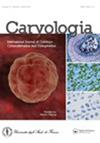Identifying potential adaptive SNPs within combined DNA sequences in Genus Crocus L. (Iridaceae family): A multiple analytical approach
IF 2.1
4区 生物学
Q2 Agricultural and Biological Sciences
引用次数: 0
Abstract
The genus Crocus L. of Iridaceae family contains about 160 species and is considered as a complex group of plant taxa with regard to evolutionary and phylogenetic events. Inter-specific hybridization and gene flow contribute to species genetic homogeneity in one hand and high within species genetic variability and species genetic content overlaps caused species resolution a problem. In spite of extensive molecular phylogenetic studies in this genus, nothing is known about DNA sequences or Single nucleotide polymorphisms (SNPs) which are of adaptive nature. Moreover, nothing is known about which geographical or environmental factors plays role in species local adaptation and speciation events within Crocus L. genus. Therefore, the present study was conducted to answer the above said questions. We used a combined molecular data set of internal transcribed spacer (ITS) nuclear gene and trnL-F intergenic spacer (trnL-F) sequences of chloroplast genome. A multiple analytical method of Canonical correlation (CCA), Redundency analysis (RDA), and Latent Factor Mixed Model (LFMM)identified a few potential adaptive SNPs. Moreover, population criterions like Tajimas’ D, molecular clock test, as well as skyline-plot revealed a smooth and continuous genetic changes for most of the Crocus species, but the occurrence of a sudden deep nucleotide substitution for Crocus taxa of Iran. The impact of latitude was significantly higher on nucleotide changes compared to that of longitudinal distribution of Crocus species.藏红花属(鸢尾花科)组合DNA序列中潜在适应性snp的鉴定:一种多重分析方法
藏红花属(genus Crocus L.)是鸢尾花科植物,约有160种,在进化和系统发生事件方面被认为是一个复杂的植物分类群。种间杂交和基因流动一方面促成了物种遗传的同质性,另一方面,种内遗传的高变异性和物种遗传含量的重叠导致了物种解决问题。尽管对该属进行了广泛的分子系统发育研究,但对具有适应性的DNA序列或单核苷酸多态性(SNPs)一无所知。此外,地理或环境因素在藏红花属物种的局部适应和物种形成事件中发挥的作用尚不清楚。因此,本研究是为了回答上述问题而进行的。我们使用了叶绿体基因组内部转录间隔段(ITS)核基因和trnL-F基因间间隔段(trnL-F)序列的组合分子数据集。通过典型相关(CCA)、冗余分析(RDA)和潜在因子混合模型(LFMM)的多重分析方法,确定了一些潜在的自适应snp。此外,Tajimas’D、分子钟测试和天线图等群体判据显示,大部分藏红花物种的遗传变化是平稳持续的,但伊朗藏红花类群发生了突然的深核苷酸替代。纬度对藏红花核苷酸变化的影响显著高于纵向分布的影响。
本文章由计算机程序翻译,如有差异,请以英文原文为准。
求助全文
约1分钟内获得全文
求助全文
来源期刊

Caryologia
生物-遗传学
CiteScore
1.60
自引率
23.80%
发文量
26
审稿时长
12 months
期刊介绍:
Caryologia is devoted to the publication of original papers, and occasionally of reviews, about plant, animal and human karyological, cytological, cytogenetic, embryological and ultrastructural studies. Articles about the structure, the organization and the biological events relating to DNA and chromatin organization in eukaryotic cells are considered. Caryologia has a strong tradition in plant and animal cytosystematics and in cytotoxicology. Bioinformatics articles may be considered, but only if they have an emphasis on the relationship between the nucleus and cytoplasm and/or the structural organization of the eukaryotic cell.
 求助内容:
求助内容: 应助结果提醒方式:
应助结果提醒方式:


